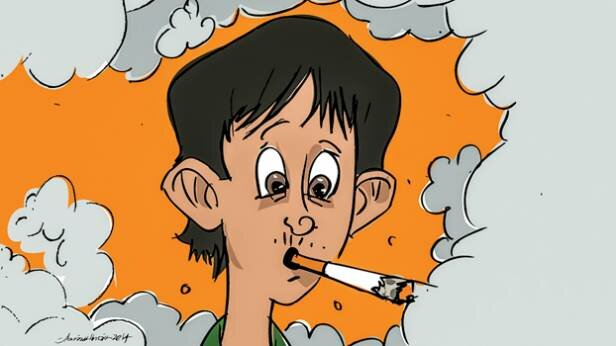By Rabia Ahmed –
How to bring about social reform by attitude inoculation
Tsunamis and revolutions do not enable social reform. That requires a change of attitude. However there are too many counter arguments for change, occurring something like this: ‘Yes we need to change for so and so reason, but…’ Often those counters are so strong that people fall before the first hurdle, because they possess no suitable response.
Take Babloo for example, whose mother tries to inculcate an anti-smoking attitude by waggling her finger at him, telling him that smoking is bad. Babloo however perceives smoking as ‘cool’ despite knowing it is wrong, because his role models, debonair Raju in eleventh grade, macho Bola Jat on television and Abu, all smoke and look so cool doing so. These images are the counter attacks on the argument against smoking. Therefore when Raju calls Babloo ‘chicken’ if he refuses a smoke, Babloo has no defence; Amma provided no responses; Babloo takes the cigarette and smokes, his first.
Should Raju, Bola and Abu be banned from smoking? Do bans ever work? Counter attacks will always exist, like the tobacco industry itself. In Pakistan, Salman Rushdie’s book, calling an Ahmadi place of worship a mosque, alcohol, kite flying, and YouTube, all are banned and we know how drastically YouTube viewership, for example, has not diminished regardless of that ban. Therefore the other option is to equip Babloo with responses to withstand counter attacks.
A character on a television play burst into tears, crying, ‘Mein subha say raat tak kaam karti hoon! Bilkul araam nahi milta mujhay. Aakhir may naukar hoon kya?’ (I work from dawn to dusk. I get no rest at all. Am I a servant?’), conveying the message that it is acceptable for servants to be overworked. Our cook, watching this play, did not react because people say such things all the time.
Employers (they have the clout), continue to overwork servants because they, the employers are used to a life of leisure. Strong counter attacks also originate from this reason: 1) we provide our domestic employees employment, a ‘quarter’, and food. So it is okay to expect them to work all hours under questionable conditions. 2) This is a poor country where job descriptions and work benefits cannot exist 3) This is how it has always been. 4) Servants must not be spoilt.
The writer of that play was right not to preach against the message (think Babloo’s mother). There are more effective ways of combating this attitude. These require the arts and media to work with educationists and psychologists to plan certain outcomes.
In the 1960s, William McGuire a social psychologist theorised that one way to change attitudes was to employ the same methods used to create a physical resistance to disease, inoculation. Inoculation is nothing but an exposure to a weakened disease producing organism such as a virus, teaching the body to resist that weak virus so that in future when a strong virus comes along the body knows how to produce antibodies and does so, beating down the virus and the disease it carries. McGuire questioned if it was possible to teach people to defend themselves against counter attacks on arguments for attitude change in the same way, by providing them with some slight practice in formulating responses to counter attacks. The answer was ‘yes,’ and ‘attitude inoculation’ was born, a term coined by McGuire.
It was by experimenting with a scenario similar to Babloo’s case that McGuire proved his theory. In his study conducted in the US in the 1980s, older and younger students participated in a series of role plays depicting younger students facing peer pressure situations.
Children younger than ten or twelve generally have a negative attitude to smoking, yet they become smokers as adolescents because they are unable to withstand peer pressure. So in this role play the older student called the younger a ‘chicken’ for example when the younger refused to smoke a cigarette offered to him. In an imaginary retort the younger student responded by saying, ‘I’d be a real chicken if I smoked just to impress you!’
This was an attempt to equip the child with a mild strategy for saying ‘no,’ which he could use to formulate other responses to actual, stronger peer pressure.
The results of this study were impressive because students who participated in this program showed up half as likely to smoke as opposed to those who did not participate.
Public service campaigns have successfully used these methods and have reported the effectiveness of this method against smoking, drug use and pregnancies among youngsters. Compared with Ammijan’s ineffective exhortations, attitude inoculation success rates (30-70% reduction) are impressive. Babloo needs to know how to respond, and what to say when someone asks him to smoke.
This method can be used in Pakistan to change attitudes regarding smoking, education, the law, marriage, human rights, religion, sectarian tolerance, sanitation…the list is endless.
Who should be targeted for this inoculation? Young students must learn to resist peer pressure, but domestic servants in our society are much too vulnerable. For the sake of a home, food and some cash they are willing to put up with a great deal of abuse. Social inoculation in our society in the television play scenario must target the employers to prevent them from being persuaded against change.
Plays, public service messages, humorous skits, and programmes in schools to catch the young are ways of conducting attitude inoculations in our society, so that when someone says ‘servants must not be spoilt’, people know how to respond. So that the woman crying about ‘working like a servant’ does not herself make her own servants work too hard, and changes her words to say ‘the long hours I am being made to work are cruel and inhuman.’ This is one way, an effective one, of bringing about change in this society that so badly needs social reform.
The writer is a journalist based in Lahore. She tweets @RabiaAhmed4































































































